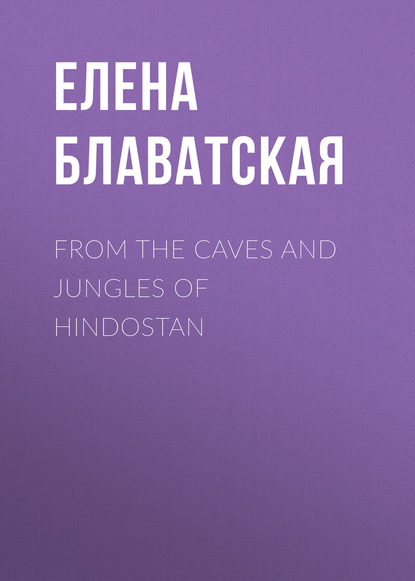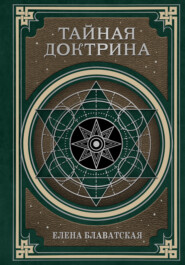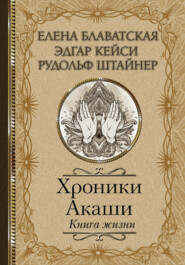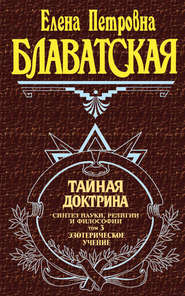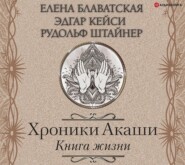По всем вопросам обращайтесь на: info@litportal.ru
(©) 2003-2024.
✖
From the Caves and Jungles of Hindostan
Настройки чтения
Размер шрифта
Высота строк
Поля
"Of course they did! Captain Pole was such a worthy man, such an honest officer, that, after his death, he could not help being promoted to the highest rank of Shanar devils. The Pe-Kovil, demon's house, sacred to his memory, stands side by side with the Pe-Kovil Bhadrakali, which was recently conferred on the wife of a certain German missionary, who also was a most charitable lady and so is very dangerous now."
"But what are their ceremonies? Tell us something about their rites."
"Their rites consist chiefly of dancing, singing, and killing sacrificial animals. The Shanars have no castes, and eat all kinds of meat. The crowd assembles about the Pe-Kovil, previously designated by the priest; there is a general beating of drums, and slaughtering of fowls, sheep and goats. When Captain Pole's turn came an ox was killed, as a thoughtful attention to the peculiar tastes of his nation. The priest appeared, covered with bangles, and holding a wand on which tinkled numberless little bells, and wearing garlands of red and white flowers round his neck, and a black mantle, on which were embroidered the ugliest fiends you can imagine. Horns were blown and drums rolled incessantly. And oh, I forgot to tell you there was also a kind of fiddle, the secret of which is known only to the Shanar priesthood. Its bow is ordinary enough, made of bamboo; but it is whispered that the strings are human veins.... When Captain Pole took possession of the priest's body, the priest leapt high in the air, and then rushed on the ox and killed him. He drank off the hot blood, and then began his dance. But what a fright he was when dancing! You know, I am not superstitious.... Am I?…"
Sham Rao looked at us inquiringly, and I, for one, was glad, at this moment, that Miss X– was half a mile off, asleep in the howdah.
"He turned, and turned, as if possessed by all the demons of Naraka. The enraged crowd hooted and howled when the priest begun to inflict deep wounds all over his body with the bloody sacrificial knife. To see him, with his hair waving in the wind and his mouth covered with foam; to see him bathing in the blood of the sacrificed animal, mixing it with his own, was more than I could bear. I felt as if hallucinated, I fancied I also was spinning round...."
Sham Rao stopped abruptly, struck dumb. Kangalim stood before us!
Her appearance was so unexpected that we all felt embarrassed. Carried away by Sham Rao's description, we had noticed neither how nor whence she came. Had she appeared from beneath the earth we could not have been more astonished. Narayan stared at her, opening wide his big jet-black eyes; the Babu clicked his tongue in utter confusion. Imagine a skeleton seven feet high, covered with brown leather, with a dead child's tiny head stuck on its bony shoulders; the eyes set so deep and at the same time flashing such fiendish flames all through your body that you begin to feel your brain stop working, your thoughts become entangled and your blood freeze in your veins.
I describe my personal impressions, and no words of mine can do them justice. My description is too weak.
Mr. Y– and the colonel both grew pale under her stare, and Mr. Y–made a movement as if about to rise.
Needless to say that such an impression could not last. As soon as the witch had turned her gleaming eyes to the kneeling crowd, it vanished as swiftly as it had come. But still all our attention was fixed on this remarkable creature.
Three hundred years old! Who can tell? Judging by her appearance, we might as well conjecture her to be a thousand. We beheld a genuine living mummy, or rather a mummy endowed with motion. She seemed to have been withering since the creation. Neither time, nor the ills of life, nor the elements could ever affect this living statue of death. The all-destroying hand of time had touched her and stopped short. Time could do no more, and so had left her. And with all this, not a single grey hair. Her long black locks shone with a greenish sheen, and fell in heavy masses down to her knees.
To my great shame, I must confess that a disgusting reminiscence flashed into my memory. I thought about the hair and the nails of corpses growing in the graves, and tried to examine the nails of the old woman.
Meanwhile, she stood motionless as if suddenly transformed into an ugly idol. In one hand she held a dish with a piece of burning camphor, in the other a handful of rice, and she never removed her burning eyes from the crowd. The pale yellow flame of the camphor flickered in the wind, and lit up her deathlike head, almost touching her chin; but she paid no heed to it. Her neck, as wrinkled as a mushroom, as thin as a stick, was surrounded by three rows of golden medallions. Her head was adorned with a golden snake. Her grotesque, hardly human body was covered by a piece of saffron-yellow muslin.
The demoniac little girls raised their heads from be-neath the leaves, and set up a prolonged animal-like howl. Their example was followed by the old man, who lay exhausted by his frantic dance.
The witch tossed her head convulsively, and began her invocations, rising on tiptoe, as if moved by some external force.
"The goddess, one of the seven sisters, begins to take possession of her," whispered Sham Rao, not even thinking of wiping away the big drops of sweat that streamed from his brow. "Look, look at her!"
This advice was quite superfluous. We were looking at her, and at nothing else.
At first, the movements of the witch were slow, unequal, somewhat convulsive; then, gradually, they became less angular; at last, as if catching the cadence of the drums, leaning all her long body forward, and writhing like an eel, she rushed round and round the blazing bonfire. A dry leaf caught in a hurricane could not fly swifter. Her bare bony feet trod noiselessly on the rocky ground. The long locks of her hair flew round her like snakes, lashing the spectators, who knelt, stretching their trembling arms towards her, and writhing as if they were alive. Whoever was touched by one of this Fury's black curls, fell down on the ground, overcome with happiness, shouting thanks to the goddess, and considering himself blessed for ever. It was not human hair that touched the happy elect, it was the goddess herself, one of the seven. Swifter and swifter fly her decrepit legs; the young, vigorous hands of the drummer can hardly follow her. But she does not think of catching the measure of his music; she rushes, she flies forward. Staring with her expressionless, motionless orbs at something before her, at something that is not visible to our mortal eyes, she hardly glances at her worshippers; then her look becomes full of fire; and whoever she looks at feels burned through to the marrow of his bones. At every glance she throws a few grains of rice. The small handful seems inexhaustible, as if the wrinkled palm contained the bottomless bag of Prince Fortunatus.
Suddenly she stops as if thunderstruck.
The mad race round the bonfire had lasted twelve minutes, but we looked in vain for a trace of fatigue on the deathlike face of the witch. She stopped only for a moment, just the necessary time for the goddess to release her. As soon as she felt free, by a single effort she jumped over the fire and plunged into the deep tank by the portico. This time, she plunged only once; and whilst she stayed under the water, the second sister-goddess entered her body. The little boy in white produced another dish, with a new piece of burning camphor, just in time for the witch to take it up, and to rush again on her headlong way.
The colonel sat with his watch in his hand. During the second obsession the witch ran, leaped, and raced for exactly fourteen minutes. After this, she plunged twice in the tank, in honor of the second sister; and with every new obsession the number of her plunges increased, till it became six.
It was already an hour and a half since the race began. All this time the witch never rested, stopping only for a few seconds, to disappear under the water.
"She is a fiend, she cannot be a woman!" exclaimed the colonel, seeing the head of the witch immersed for the sixth time in the water.
"Hang me if I know!" grumbled Mr. Y–, nervously pulling his beard. "The only thing I know is that a grain of her cursed rice entered my throat, and I can't get it out!"
"Hush, hush! Please, do be quiet!" implored Sham Rao. "By talking you will spoil the whole business!"
I glanced at Narayan and lost myself in conjectures. His features, which usually were so calm and serene, were quite altered at this moment, by a deep shadow of suffering. His lips trembled, and the pupils of his eyes were dilated, as if by a dose of belladonna. His eyes were lifted over the heads of the crowd, as if in his disgust he tried not to see what was before him, and at the same time could not see it, engaged in a deep reverie, which carried him away from us, and from the whole performance.
"What is the matter with him?" was my thought, but I had no time to ask him, because the witch was again in full swing, chasing her own shadow.
But with the seventh goddess the programme was slightly changed. The running of the old woman changed to leaping. Sometimes bending down to the ground, like a black panther, she leaped up to some worshipper, and halting before him touched his forehead with her finger, while her long, thin body shook with inaudible laughter. Then, again, as if shrinking back playfully from her shadow, and chased by it, in some uncanny game, the witch appeared to us like a horrid caricature of Dinorah, dancing her mad dance. Suddenly she straightened herself to her full height, darted to the portico and crouched before the smoking censer, beating her forehead against the granite steps. Another jump, and she was quite close to us, before the head of the monstrous Sivatherium. She knelt down again and bowed her head to the ground several times, with the sound of an empty barrel knocked against something hard.
We had hardly the time to spring to our feet and shrink back when she appeared on the top of the Sivatherium's head, standing there amongst the horns.
Narayan alone did not stir, and fearlessly looked straight in the eyes of the frightful sorceress.
But what was this? Who spoke in those deep manly tones? Her lips were moving, from her breast were issuing those quick, abrupt phrases, but the voice sounded hollow as if coming from beneath the ground.
"Hush, hush!" whispered Sham Rao, his whole body trembling. "She is going to prophesy!.... " "She?" incredulously inquired Mr. Y–. "This a woman's voice? I don't believe it for a moment. Someone's uncle must be stowed away somewhere about the place. Not the fabulous uncle she inherited from, but a real live one!…"
Sham Rao winced under the irony of this supposition, and cast an imploring look at the speaker.
"Woe to you! woe to you!" echoed the voice. "Woe to you, children of the impure Jaya and Vijaya! of the mocking, unbelieving lingerers round great Shiva's door! Ye, who are cursed by eighty thousand sages! Woe to you who believe not in the goddess Kali, and you who deny us, her Seven divine Sisters! Flesh-eating, yellow-legged vultures! friends of the oppressors of our land! dogs who are not ashamed to eat from the same trough with the Bellati!" (foreigners).
"It seems to me that your prophetess only foretells the past," said Mr. Y–, philosophically putting his hands in his pockets. "I should say that she is hinting at you, my dear Sham Rao."
"Yes! and at us also," murmured the colonel, who was evidently beginning to feel uneasy.
As to the unlucky Sham Rao, he broke out in a cold sweat, and tried to assure us that we were mistaken, that we did not fully understand her language.
"It is not about you, it is not about you! It is of me she speaks, because I am in Government service. Oh, she is inexorable!"
"Rakshasas! Asuras!" thundered the voice. "How dare you appear before us? how dare you to stand on this holy ground in boots made of a cow's sacred skin? Be cursed for etern–"
But her curse was not destined to be finished. In an instant the Hercules-like Narayan had fallen on the Sivatherium, and upset the whole pile, the skull, the horns and the demoniac Pythia included. A second more, and we thought we saw the witch flying in the air towards the portico. A confused vision of a stout, shaven Brahman, suddenly emerging from under the Sivatherium and instantly disappearing in the hollow beneath it, flashed before my dilated eyes.
But, alas! after the third second had passed, we all came to the embarrassing conclusion that, judging from the loud clang of the door of the cave, the representative of the Seven Sisters had ignominiously fled. The moment she had disappeared from our inquisitive eyes to her subterranean domain, we all realized that the unearthly hollow voice we had heard had nothing supernatural about it and belonged to the Brahman hidden under the Sivatherium—to someone's live uncle, as Mr. Y– had rightly supposed.
Oh, Narayan! how carelessly.... how disorderly the worlds rotate around us.... I begin to seriously doubt their reality. From this moment I shall earnestly believe that all things in the universe are nothing but illusion, a mere Maya. I am becoming a Vedantin.... I doubt that in the whole universe there may be found anything more objective than a Hindu witch flying up the spout.–
Miss X– woke up, and asked what was the meaning of all this noise. The noise of many voices and the sounds of the many retreating footsteps, the general rush of the crowd, had frightened her. She listened to us with a condescending smile, and a few yawns, and went to sleep again.
Next morning, at daybreak, we very reluctantly, it must be owned, bade good-bye to the kind-hearted, good-natured Sham Rao. The confoundingly easy victory of Narayan hung heavily on his mind. His faith in the holy hermitess and the seven goddesses was a good deal shaken by the shameful capitulation of the Sisters, who had surrendered at the first blow from a mere mortal. But during the dark hours of the night he had had time to think it over, and to shake off the uneasy feeling of having unwillingly misled and disappointed his European friends.
Sham Rao still looked confused when he shook hands with us at parting, and expressed to us the best wishes of his family and himself.
As to the heroes of this truthful narrative, they mounted their elephants once more, and directed their heavy steps towards the high road and Jubbulpore.
God's Warrior
The direction of our pilgrimage of self-improvement lay towards the north-west, as was previously decided. We were very impatient to see these status in statu of Anglo-India, but.... Do what you may, there always will be a but.
We left the Jubbulpore line several miles from Nassik; and, to return to it, we had to go back to Akbarpur, then travel by doubtful Local-Board roads to the station Vanevad and take the train of Holkar's line, which joins the Great Indian Peninsular Railway.
Meanwhile, the Bagh caves were quite close to us, not more than fifty miles off, to the east from Mandu. We were undecided whether to leave them alone or go back to the Nerbudda. In the country situated on the other side of Kandesh, our Babu had some "chums," as everywhere else in India; the omnipresent Bengali Babus, who are always glad to be of some service to you, are scattered all over Hindostan, like the Jews in Russia. Besides, our party was joined by a new member.





